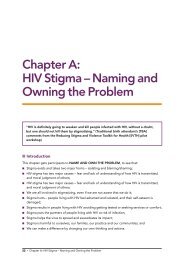Implementing Multiple Gender Strategies to Improve HIV and ... - ICRW
Implementing Multiple Gender Strategies to Improve HIV and ... - ICRW
Implementing Multiple Gender Strategies to Improve HIV and ... - ICRW
You also want an ePaper? Increase the reach of your titles
YUMPU automatically turns print PDFs into web optimized ePapers that Google loves.
COMPREHENSIVE SEXUALITY, FAMILY LIFE, AND <strong>HIV</strong>/AIDS<br />
EDUCATION<br />
LEAD ORGANIZATIONS:<br />
COUNTRY:<br />
<strong>HIV</strong> PROGRAM AREA:<br />
Girls Power Initiative (GPI)<br />
Nigeria<br />
Prevention<br />
OVERVIEW:<br />
Comprehensive Sexuality, Family Life <strong>and</strong> <strong>HIV</strong>/AIDS Education (SLFHE) is a three-year program that<br />
trains adolescent girls in <strong>HIV</strong> prevention, sexual <strong>and</strong> reproductive health, sexuality, <strong>and</strong> life skills. GPI<br />
trains teachers <strong>to</strong> implement the curriculum at schools <strong>and</strong> local centers. The curriculum <strong>to</strong>pics are<br />
personal empowerment, body image, <strong>and</strong> violence the first year; sexual <strong>and</strong> reproductive health <strong>and</strong><br />
rights, gender-based violence, <strong>and</strong> <strong>HIV</strong> <strong>and</strong> AIDS the second year; <strong>and</strong> girls’ <strong>and</strong> women’s rights,<br />
political application of feminist theory, <strong>and</strong> women in society <strong>and</strong> culture the third year. Program<br />
graduates can then seek <strong>to</strong> qualify <strong>to</strong> work as peer educa<strong>to</strong>rs. In addition <strong>to</strong> this three-year program,<br />
SLFHE offers girls life skills training. Evaluation results show that participants are better able <strong>to</strong> take<br />
on leadership roles <strong>and</strong> make informed decisions in their relationships, <strong>and</strong> that the program has<br />
helped reduce harmful traditional practices <strong>and</strong> increase knowledge of sexuality issues among youth.<br />
The program has benefited from its “training-of-trainers” model by building sufficient local capacity <strong>to</strong><br />
implement the curriculum, thereby meeting dem<strong>and</strong> <strong>and</strong> relieving the burden on GPI <strong>to</strong> conduct all<br />
trainings.<br />
BACKGROUND<br />
<strong>HIV</strong> & AIDS<br />
Program Goals<br />
The Comprehensive Sexuality, Family Life <strong>and</strong> <strong>HIV</strong>/AIDS Education<br />
(SLFHE) is a three-year program that trains adolescent girls in <strong>HIV</strong> <strong>and</strong><br />
AIDS prevention, sexual <strong>and</strong> reproductive health, human sexuality,<br />
leadership, <strong>and</strong> life skills.<br />
<strong>Gender</strong> <strong>Strategies</strong><br />
Addressed<br />
<br />
<br />
<br />
<br />
<br />
Reducing violence <strong>and</strong> coercion<br />
Addressing male norms <strong>and</strong> behaviors<br />
Increasing women’s legal protection<br />
Increasing women’s access <strong>to</strong> income <strong>and</strong> productive resources<br />
Other: girls’ empowerment <strong>and</strong> gender equity<br />
Description of<br />
Intervention<br />
The SLFHE program is a three-year program that educates in-school<br />
adolescent girls ages 10–19 about <strong>HIV</strong> <strong>and</strong> AIDS, human rights, gender<br />
equality <strong>and</strong> life skills. Sessions are conducted in schools, led by teachers<br />
trained by GPI, <strong>and</strong> in three-hour weekly educational sessions held at GPI’s<br />
four centers, led by trained youth facilita<strong>to</strong>rs (GPI program staff <strong>and</strong> others).<br />
Eight current facilita<strong>to</strong>rs are former SLFHE graduates who now work for<br />
GPI after completing their university degree.<br />
Girls can enter the program at any point during their schooling years after<br />
age 10. Participants are divided in<strong>to</strong> four age groups: ages 10–12, 13–14,<br />
15–16, <strong>and</strong> 17–18. At registration, each girl completes a survey <strong>to</strong> assess<br />
her knowledge about gender roles in terms of what roles she <strong>and</strong> her male<br />
siblings play in their homes, <strong>and</strong> her knowledge, attitudes, <strong>and</strong> beliefs on<br />
<strong>to</strong>pics such as personal empowerment, body image, self-esteem,<br />
103
















